4 Best Node.js Hosting Providers 2024
Our independent research projects and impartial reviews are funded in part by affiliate commissions, at no extra cost to our readers. Learn more
Choosing the best Node.js hosting provider is central to getting a great experience —a poor decision can lead to slow load times, lack of scalability, or constant outages that frustrate users and tank conversion rates. With so many web hosting options promising all the bells and whistles, identifying the best choices for your application can feel overwhelming.
By evaluating hosting against the metrics that matter most for Node.js applications, we’ve identified Hostinger as the number one solution that delivers speed, reliability, and developer convenience at fair prices.
The 4 Best Node.js Hosting Providers
- Hostinger – Best all-around hosting provider
- Bluehost – Best for beginners
- InMotion – Best for reliable uptime and quick server response
- A2 Hosting – High-speed hosting capabilities
1. Hostinger
Best all-around hosting provider
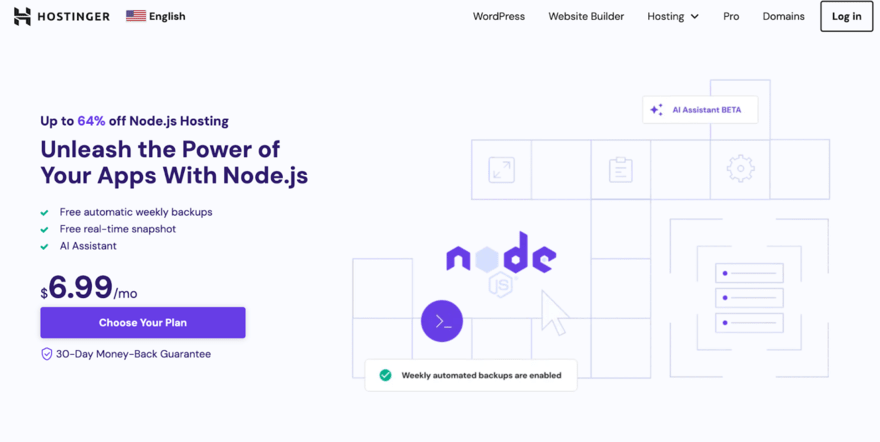
With high-performance infrastructure and affordable pricing starting at $5.99 per month, Hostinger is ranked as our number one Node.js hosting provider. Its virtual private servers (VPS) offer formidable resources to handle demanding Node.js workloads, global deployment reach, and advanced self-service management capabilities, albeit without extensive hand-holding support.
Pros & Cons
✔️ What We Liked:
- Affordable pricing: Hostinger’s Node.js hosting starts at just $5.99 per month, making it accessible to a wide range of users.
- Performance: The hosting plans come with high-performance capabilities like NVMe Disk space for efficient handling of Node.js applications.
- Global reach: Hostinger has servers around the world, which can be beneficial for global application deployment and reducing latency.
- 30-day money-back guarantee: Hostinger is a risk-free investment, meaning users can test the service before they fully commit.
❌ What We Didn’t Like:
- Self-managed technical support: For Node.js server hosting, the support is self-managed, which isn’t ideal for beginners or anyone who prefers extensive technical assistance.
- No automatic Node.js updates: Users have to manually update Node.js, which could be a downside for those looking for automated solutions.
Who Should Choose Hostinger?
| Recommended For | Not Recommended For |
|---|---|
| Medium-sized and large-scale websites with heavy traffic | Beginners needing extensive technical support |
| Users needing high-performance capabilities | Anyone preferring automated Node.js updates |
| Those seeking global server reach | - |
Performance and Scalability
Hostinger’s VPS provides an infrastructure ideal for mid-sized to large Node.js sites that need to handle many simultaneous connections. The non-blocking input and output architecture innate to Node.js draws out the best in Hostinger’s allocated VPS resources for things like processor cores and bandwidth availability per customer. Moreover, its CDN, or Content Delivery Network, really helps speed up website loading times by distributing content across multiple servers worldwide.
However, Hostinger categorized these Node.js-hosted VPS plans as self-managed—so while users gain greater control privileges, they also take on administering optimization and routine upkeep. A responsibility exchange like this means developers need to actively monitor and tune both server infrastructure and Node.js application performance.
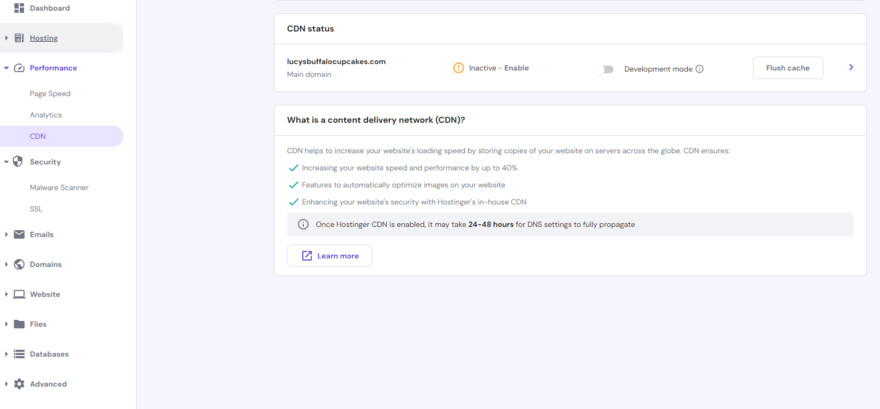
Compatibility and Support
You can customize and use different releases of Node.js matched to particular application requirements when using Hostinger. Though automatic updating to the latest Node.js editions isn’t available—upgrades rely on manual intervention through provided LiteSpeed channels.
Hostinger’s VPS service requires users to handle routine server management themselves, but it does offer help through its customer service and an AI chatbot. It also provides educational materials to teach users how to manage their servers and get the most out of Node.js applications.
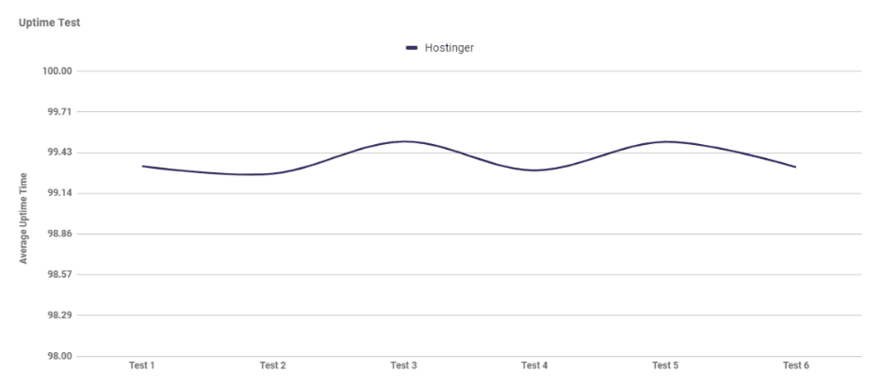
Security and Reliability
Security is tight, thanks to VPS hosting with general protections such as malware detection scanning and dedicated IP allotments per user server. But providers do not outline specialized measures for securing Node.js apps specifically, which may leave some customers implementing additional best practices themselves.
It’s worth noting, however, that Node.js itself has its own security best practices. It’s important for users to follow these guidelines when using Node.js applications on a VPS.
Our Final Thoughts on Hostinger
Hostinger hits the mark for medium-large Node.js sites needing robust self-service infrastructure at $5.99 monthly. Users gain formidable resources and global reach for their Node.js creations.
Find Out More:
- Read our Hostinger Pricing Review for a closer look at its plans and costs
2. Bluehost
Best for beginners

With support for building and scaling Node.js apps, Bluehost lets your website keep pace with soaring traffic and ambitious goals. But between its tiered pricing, customizable servers, and integrated WordPress tools, identifying the best fit for your needs can prove tricky. How do savvy Node.js developers choose the ideal plan from this legacy hosting provider?
Pros & Cons
✔️ What We Liked:
- 30-day money-back guarantee: Bluehost offers a 30-day money-back guarantee, giving users a risk-free trial period.
- High uptime: With an advertised 99.98% uptime, Bluehost claims reliability and consistent availability for your Node.js applications.
- Free domain and backups: These features provide added value, reducing initial costs and ensuring data safety.
- Range of disk space options: Bluehost offers plans with disk space ranging from 30GB to unlimited, catering to different application sizes.
❌ What We Didn’t Like:
- Limited RAM and CPU: The cheapest Node.js plan has a RAM cap of 2GB and a dual-core CPU, which might be restrictive for larger or more demanding applications.
- Bandwidth limitation: The maximum bandwidth offered is 1TB, which could be a limiting factor for high-traffic applications.
Who Should Choose Bluehost?
| Recommended For | Not Recommended For |
|---|---|
| Small to medium-sized Node.js applications | Large-scale applications requiring extensive RAM |
| Beginners and small businesses | Websites expecting extremely high traffic |
| Users looking for a free domain and backups | - |
Performance and Scalability
While Bluehost offers a high level of reliability with its 99.98% uptime, its cheapest Node.js plan has some limitations, such as a maximum of 2GB RAM and 30GB disk space—and only one IP address is assigned to users. This might be adequate for small to medium-sized applications but could be a limiting factor for larger, more resource-intensive applications. Hostinger, on the other hand, offers high-performance capabilities like NVMe disk space and global server reach to efficiently handle more demanding Node.js workloads.
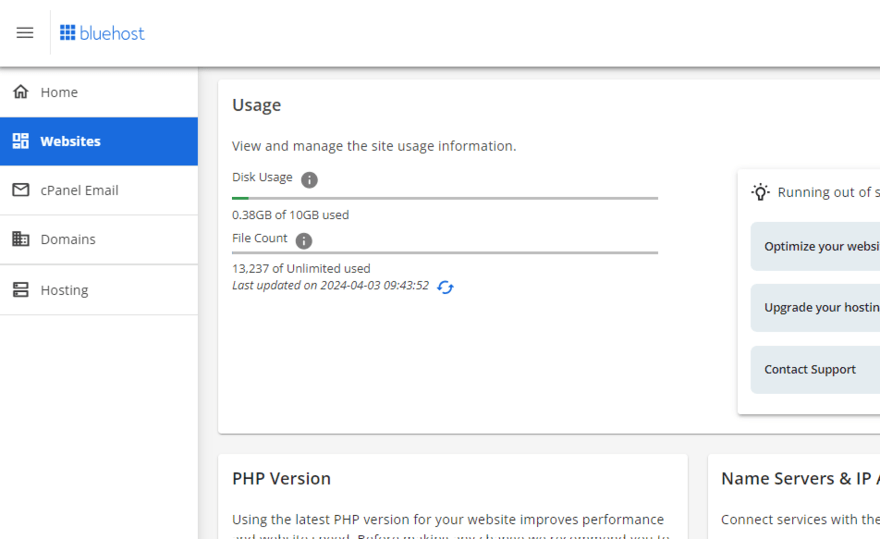
Compatibility and Support
Using Bluehost means getting a user-friendly environment for Node.js hosting with additional features like free domain and backups. That’s all well and good, but detailed information regarding specific Node.js version support or runtime environments isn’t explicitly mentioned. Therefore, advertised speeds might not wholly align with using Node.js applications. Beyond that, Bluehost’s advertised runtime of 99.98% can be patchy at best, as found out in our in-depth Bluehost review.
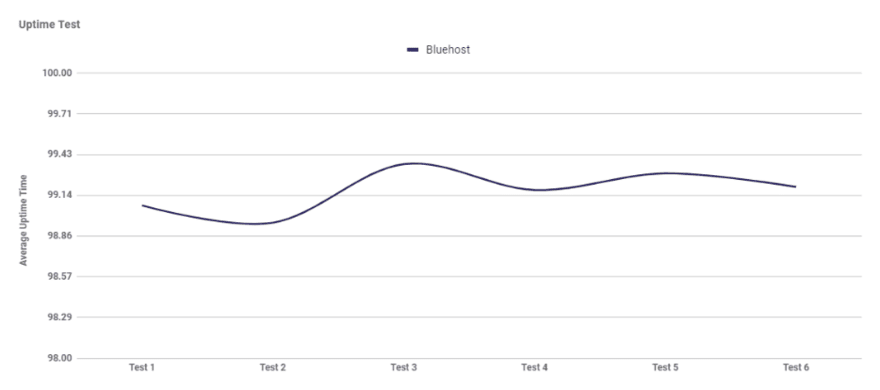
Security and Reliability
Bluehost’s hosting plans include free SSL certificates, which are standard security features. However, users looking for advanced security features, such as DDoS protection or automatic staging and updates, may find these lacking in the cheaper plans.
Our Final Thoughts on Bluehost
Bluehost delivers easy Node.js hosting with a free domain and backups but falls short on resources for larger apps. The 2GB RAM and 30GB storage prove limiting beyond small projects, while the claimed 99.98% uptime missed the mark in testing. Still, with a $19.99 per month standard plan and cPanel interface, you’ll get a friendly starter option.
Find Out More
- Torn between Hostinger and Bluehost? Read our Hostinger vs Bluehost comparison to find the best option for you.
3. InMotion
Best for reliable uptime and quick server response
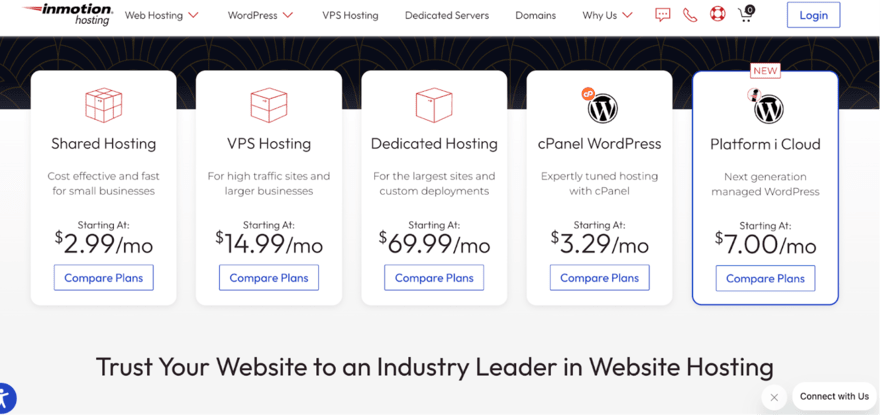
Whether you’re just testing Node.js waters or prepared to dive into dedicated servers, InMotion has flexible plans for a range of needs. How do its tools empower Node.js devotees to create top-notch Node.js applications? Let’s take a closer look at InMotion’s performance.
Pros & Cons
✔️ What We Liked:
- Unlimited resources: With unlimited disk space and bandwidth, even on basic plans, InMotion is ideal for Node.js applications of various sizes.
- Security: Every plan comes with a free SSL certificate, and hack and malware protection, which maintains the integrity of Node.js applications.
- Customer support: InMotion provides a solid backbone for technical assistance with a wide array of support options, including 24/7 live chat, email, and phone support.
❌ What We Didn’t Like:
- Upsells: Like many hosting providers, InMotion presents several additional features at checkout, which could lead to higher costs if you’re not sure what you’re looking for.
- US-centric servers: With data centers only in the U.S., global reach might be limited, potentially impacting site performance for international traffic.
- Cost: There’s a shared hosting option for $3.49 per month (paid annually), but it renews at $9.99 per month.
Who Should Choose InMotion?
| Recommended For | Not Recommended For |
|---|---|
| Businesses looking for scalable hosting options | Users targeting a global audience outside the U.S. |
| Those prioritizing security and customer support | Customers seeking the lowest-cost hosting options |
| Users who want a range of support options and extensive documentation | - |
Performance and Scalability
With options ranging from shared to dedicated hosting, InMotion can accommodate the scaling needs of Node.js applications. The availability of unlimited resources on pricer plans even allows for flexibility as your site’s traffic grows.
Compatibility and Support
InMotion’s hosting plans are equipped with cPanel and Softaculous, facilitating easy application installations. While they offer a breadth of support options, the quality of service may vary depending on the chosen plan.
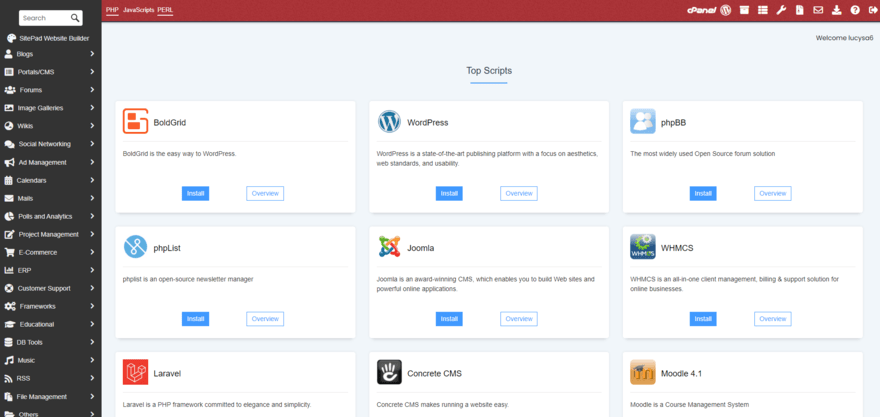
Security and Reliability
A secure hosting environment is afforded by InMotion through protections like SSL certificates, DDoS defense, and safeguards against hacking and malware built into all plans. Such capabilities are important for shielding user data and upholding website stability.
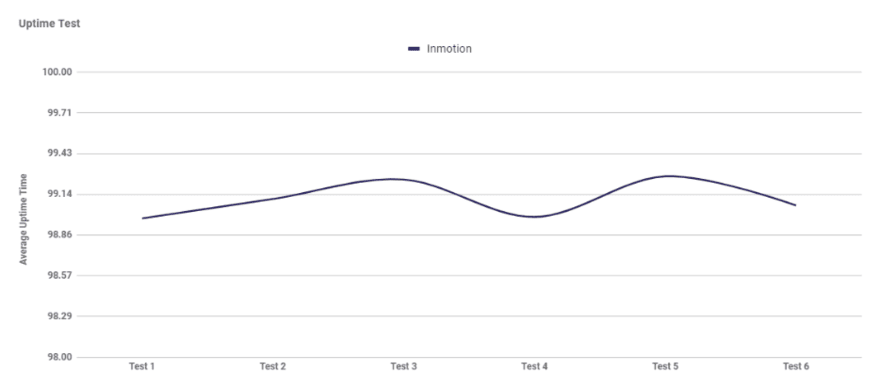
Final Thoughts on InMotion
InMotion floats scalable Node.js options with unlimited resources and extensive customer support. However, global reach proves limited given that it is solely US-based servers, and open-ended pricing means costs can be more than expected costs. Still, robust security and managed installations enable smooth node deployments.
Find Out More
- Check out our InMotion vs Bluehost comparison for a side-by-side breakdown of each host
4. A2 Hosting
High-speed hosting capabilities
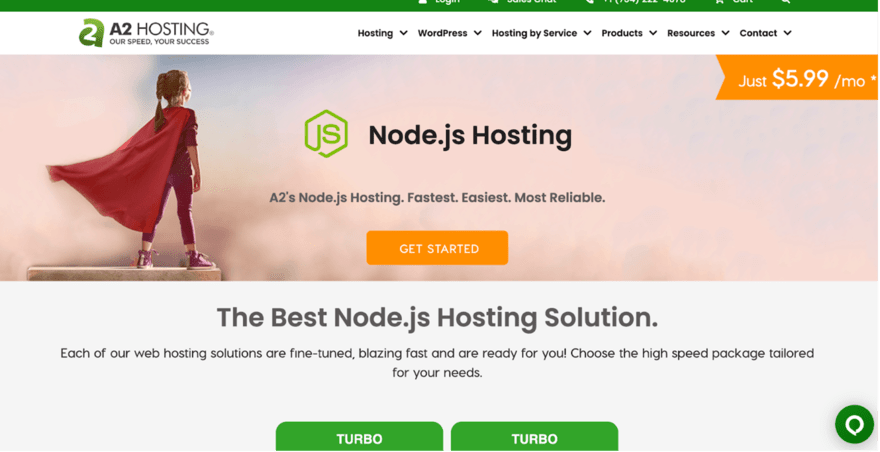
A2 Hosting is recognized for its variety of hosting plans that are compatible with Node.js, including shared, VPS, and dedicated hosting options. Here’s an organized summary of what A2 Hosting offers:
Pros & Cons
✔️ What We Liked:
- Competitive pricing: A2 Hosting’s shared hosting plans are affordable, with the entry-level plan starting at $2.99/month, offering 100 GB SSD storage and a free SSL certificate.
- Performance: Its Turbo plans come with NVMe SSDs on AMD EPYC servers, which can significantly boost the speed of Node.js applications.
- Developer-friendly: A2 Hosting provides tools and features that cater to developers, including multiple versions of PHP, Node.js, and Python support, along with a one-click installer for various applications.
- Support: The Guru Crew support team is available 24/7 to offer assistance via ticketing, live chat, and phone.
❌ What We Didn’t Like:
- Upsells at checkout: Users might encounter additional offers for features like backup tools and dedicated IPs during the purchase process, which raise the overall cost if selected.
- Domain name costs: While you get a free domain name with some plans, domain privacy comes at an additional cost of $9.95 per year per domain name.
Who Should Choose A2 Hosting?
| Recommended For | Not Recommended For |
|---|---|
| Developers looking for a range of tools and multiple Node.js versions | Those who prefer a hosting service with more inclusive domain privacy at no extra cost |
| Users seeking high-performance capabilities for dynamic Node.js applications | Beginners who might find the abundance of developer-focused tools overwhelming |
| Sites that require fast page loading times and performance optimization | - |
Performance and Scalability
The Turbo Boost and Turbo Max shared hosting plans are designed to deliver enhanced performance, making them a good choice for SEO optimization and handling traffic spikes. For scalability, A2 Hosting’s VPS and dedicated plans provide ample resources for growing Node.js applications.
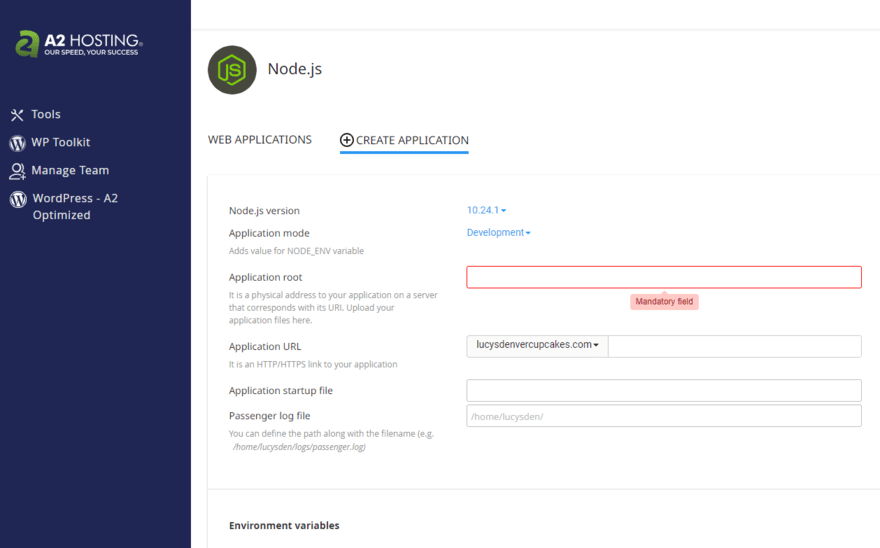
Compatibility and Support
A2 Hosting is geared towards developers with support for Node.js and an environment that’s ready for development and deployment. Its cPanel offers a traditional interface for hosting management, and it provides a comprehensive knowledge base for self-help.
Security and Reliability
A2 Hosting offers a secure hosting environment with free SSL certificates, DDoS protection, and dual firewalls. It also advertises a 99.9% uptime commitment, further emphasizing reliability.
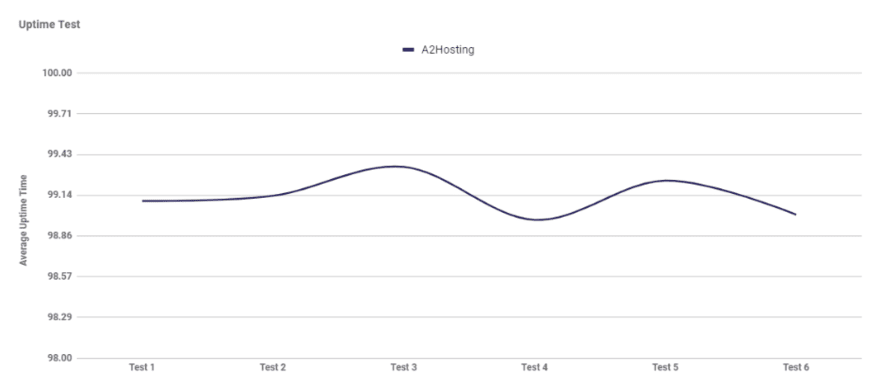
Final Thoughts on A2 Hosting
A2 Hosting accelerates Node.js apps with finely-tuned Turbo plans and bolsters development through multiple runtimes and one-click CMS installs. But upcharges at checkout and modest domain privacy may prove frustrating for some. Still, stellar performance and around-the-clock support empower smooth deployments.
How To Choose a Node.js Hosting Provider
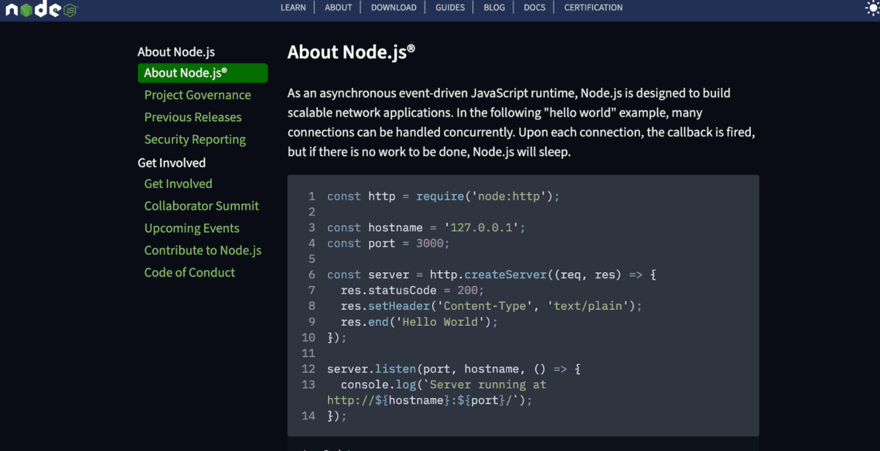
When selecting a hosting provider for your node.js application, speed and scalability should be top priorities. You want an infrastructure specifically optimized for Node.js’s asynchronous, event-driven architecture.
Speed and Scalability
Start by understanding Node.js deployment options, as the following all have different pros and cons:
- Shared servers
- Containers
- VPS
- Dedicated hardware
Shared hosting plans often have resource constraints, while containers allow effortless vertical scaling.
Evaluate hardware like SSD storage for faster I/O alongside ample RAM and vCPUs. These empower handling greater concurrent connections, which is crucial for Node.js’s non-blocking model. Auto-scaling to adjust capacity also prevents outages during traffic spikes.
Reliability
Uptime history over 99% ensures reliability because Node.js apps drop connections if the servers restart. CDN integration also speeds up content delivery around when using the globe.
Security
Security features are important and should be as standard:
- Firewalls
- VPNs
- Backups
- SSL
- Ease of TLS implementation for HTTPS websites is important as well.
Compatibility
Pay attention to OS and Node.js runtime support—multiple Node.js versions, NPM, Git, and popular frameworks offered out of the box prevent headaches. Managed Docker installations can assist with configuration and patching.
Costs and Support
Finally, consider costs, support responsiveness, and usability of admin interfaces. Node.js apps have complex deployment needs, such as
- Intuitive control panels
- DevOps pipelines
- Expert assistance
These all keep things running smoothly.
Prioritizing performance, scalability, security, and convenience creates the best foundation for Node.js hosting. Balancing features with costs lets you match the right provider to Node.js application requirements now and in the future.
The key is an infrastructure accommodating Node.js’s asynchronous needs while offloading Ops work so developers can deliver innovative apps rather than fighting fires.
Find Out More
- Check out the Best Free SSL Providers to ensure your web hosting includes this key feature
- Unsure which hosting type to use for your Node.js hosting? We discuss the different Types of Web Hosting in our full guide
How We Test Hosting Providers
We tested 27 hosting providers to evaluate them in terms of price, performance, features, help and support, and more so we can make the most useful recommendations to our readers.
Our rigorous testing process means these products have been scored and rated in five main categories of investigation and 30 subcategories. In total, we cover 282 areas of investigation—and we go through this process for every type of hosting the provider has to offer!
Our main testing categories for hosting providers are:
- Price: the cost associated with the hosting services provided by a hosting provider, such as subscription plans, pricing tiers, and any additional fees or charges.
- Performance: the speed, reliability, and overall performance of a hosting provider’s servers. It encompasses factors such as server uptime and response time.
- Features: the specific functionalities and capabilities provided by a hosting provider, including storage space, bandwidth allocation, and server location.
- Help and Support: the assistance and resources available to users when they encounter issues or need guidance, e.g. tutorials and email or chat support.
- Market Analysis / Customer Score: the assessment of the hosting provider’s position and reputation in the market.
Summary: Best Node.js Hosting Providers
Hostinger, Bluehost, InMotion, and A2 Hosting are top Node.js hosting providers with strong performance, scalability, reliability, developer support, and affordability for Node.js apps of varying sizes.
Any one of these will provide a solid Node.js hosting experience, but our money is on Hostinger thanks to its affordability and solid infrastructure designed for a seamless experience.
Leave a comment